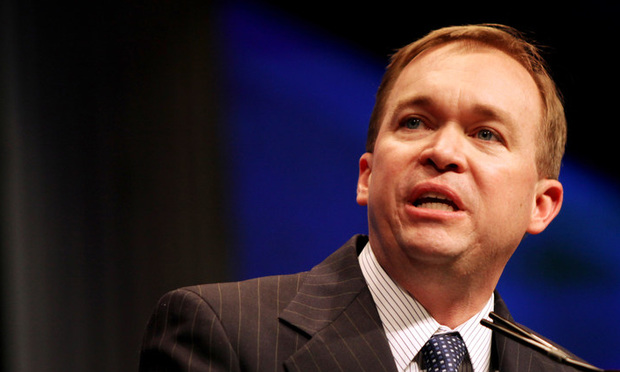CFPB Moves to Drop, Delay Cases as Priorities Shift Under Mick Mulvaney
"This case should never have been brought in the first place. We're pleased that the bureau has decided to withdraw a lawsuit," Lori Alvino McGill, a Wilkinson Walsh + Eskovitz partner, said about the CFPB's decision Thursday to drop a lawsuit against payday lenders in Kansas federal court.
January 18, 2018 at 05:55 PM
5 minute read
 Mick Mulvaney. Credit: Gage Skidmore via Wikimedia Commons
Mick Mulvaney. Credit: Gage Skidmore via Wikimedia Commons The Consumer Financial Protection Bureau on Thursday dropped a suit in Kansas federal court against four payday lenders, the latest signal the Trump-appointed interim director of the agency is shifting enforcement priorities.
CFPB enforcement attorneys in other cases have requested deadline extensions. Separately, the bureau's enforcers, in talks with defense lawyers, are proposing agreements that would temporarily stop the running of the statute of limitations on certain allegations, giving the agency more time to make decisions about how to proceed.
The Obama-era CFPB had sued the four payday companies in April, alleging they had mistreated customers by collecting on debts that were not legally owed. The agency said the debts were void because their annual interest rates, ranging from 440 percent to 950 percent, violated state interest rate caps.
The payday loan industry has been perhaps the biggest immediate beneficiary of Mick Mulvaney's tenure atop the CFPB as the interim director. Earlier this week, Mulvaney, the White House budget director, said the CFPB planned to reconsider rules, finalized last year, that put restrictions on high-cost payday loans. Mulvaney has launched an agencywide review of cases, and Thursday's action could be the first of other moves to drop lawsuits and shift resources to other matters. Mulvaney did not ask for any additional funding for the agency.
 Lori Alvino McGill
Lori Alvino McGillCiting their affiliation with a Native American tribe, the companies, represented by Beth Wilkinson, a name partner at Wilkinson Walsh + Eskovitz, argued they were not subject to the state licensing requirements and interest rate caps. On Wednesday, the CFPB filed a notice of voluntary dismissal. The bureau offered no explanation for the move, which was first reported by Bloomberg.
“[T]his case should never have been brought in the first place. We're pleased that the bureau has decided to withdraw a lawsuit that was diverting the tribe's resources and attention away from economic activity that benefits the Tribe's members and its neighbors,” Lori Alvino McGill, a Wilkinson Walsh partner, said in a statement.
The dismissal of the case drew the ire of consumer interest groups.
Mulvaney's decision gave “a free pass to lenders that are collecting on illegal loans that charge an obscene 950 percent interest,” Lauren Saunders, associate director of the National Consumer Law Center, said in a statement.
As Mulvaney reviews the agency's cases, bureau lawyers are buying time.
In the U.S. Court of Appeals for the Ninth Circuit on Thursday, CFPB lawyers asked for an extension in a fight over a subpoena—known as a “civil investigative demand”—the agency had issued to Future Income Payments, a California-based provider of pension advances. The CFPB asked for an upcoming Jan. 25 deadline to be pushed to March 12 to “allow new leadership personnel adequate time to consider the issues relevant to this case.”
Meanwhile, a lawyer on the CFPB's enforcement command staff is preparing to leave the agency to join the California-based Public Rights Project in February as legal director.
Joanna Pearl, the chief of staff under the past three enforcement directors, played a key role in setting the CFPB's enforcement strategy. She was not immediately reached for comment.
Pearl will lead the group's work “to assist state and local governments looking to expand their efforts to enforce civil rights, consumer protection, and environmental laws,” Jill Habig, founder and president of the Public Rights Project, said in a statement. Habig said Pearl's “background and experience leading enforcement teams to protect consumers from fraud and predatory conduct will be a huge asset.”
This report was updated on Jan. 19 with additional information.
Read more:
Three Things Companies Hate About the CFPB's Investigative Demands
Ex-Williams & Connolly Associate Snags Senior Adviser Post at Mulvaney's CFPB
Federal Judge, For Second Time, Won't Yank Mulvaney From CFPB Director's Chair
CFPB Suspends 1 Investigation as Mulvaney, at Helm, Reviews Pending Cases
Companies Plot New Approaches to CFPB as Trump's Team Takes Control
Goodwin Procter Grabs Anthony Alexis, Formerly CFPB's Enforcement Chief
This content has been archived. It is available through our partners, LexisNexis® and Bloomberg Law.
To view this content, please continue to their sites.
Not a Lexis Subscriber?
Subscribe Now
Not a Bloomberg Law Subscriber?
Subscribe Now
NOT FOR REPRINT
© 2025 ALM Global, LLC, All Rights Reserved. Request academic re-use from www.copyright.com. All other uses, submit a request to [email protected]. For more information visit Asset & Logo Licensing.
You Might Like
View All
FTC Sues PepsiCo for Alleged Price Break to Big-Box Retailer, Incurs Holyoak's Wrath
5 minute read
Supreme Court Will Hear Religious Parents' Bid to Opt Out of LGBTQ-Themed School Books

Wells Fargo and Bank of America Agree to Pay Combined $60 Million to Settle SEC Probe
Trending Stories
- 1With New Civil Jury Selection Rule, Litigants Should Carefully Weigh Waiver Risks
- 2Young Lawyers Become Old(er) Lawyers
- 3Caught In the In Between: A Legal Roadmap for the Sandwich Generation
- 4Top 10 Developments, Lessons, and Reminders of 2024
- 5Gift and Estate Tax Opportunities and Potential Traps in 2025 for Our New York High Net Worth Clients
Who Got The Work
J. Brugh Lower of Gibbons has entered an appearance for industrial equipment supplier Devco Corporation in a pending trademark infringement lawsuit. The suit, accusing the defendant of selling knock-off Graco products, was filed Dec. 18 in New Jersey District Court by Rivkin Radler on behalf of Graco Inc. and Graco Minnesota. The case, assigned to U.S. District Judge Zahid N. Quraishi, is 3:24-cv-11294, Graco Inc. et al v. Devco Corporation.
Who Got The Work
Rebecca Maller-Stein and Kent A. Yalowitz of Arnold & Porter Kaye Scholer have entered their appearances for Hanaco Venture Capital and its executives, Lior Prosor and David Frankel, in a pending securities lawsuit. The action, filed on Dec. 24 in New York Southern District Court by Zell, Aron & Co. on behalf of Goldeneye Advisors, accuses the defendants of negligently and fraudulently managing the plaintiff's $1 million investment. The case, assigned to U.S. District Judge Vernon S. Broderick, is 1:24-cv-09918, Goldeneye Advisors, LLC v. Hanaco Venture Capital, Ltd. et al.
Who Got The Work
Attorneys from A&O Shearman has stepped in as defense counsel for Toronto-Dominion Bank and other defendants in a pending securities class action. The suit, filed Dec. 11 in New York Southern District Court by Bleichmar Fonti & Auld, accuses the defendants of concealing the bank's 'pervasive' deficiencies in regards to its compliance with the Bank Secrecy Act and the quality of its anti-money laundering controls. The case, assigned to U.S. District Judge Arun Subramanian, is 1:24-cv-09445, Gonzalez v. The Toronto-Dominion Bank et al.
Who Got The Work
Crown Castle International, a Pennsylvania company providing shared communications infrastructure, has turned to Luke D. Wolf of Gordon Rees Scully Mansukhani to fend off a pending breach-of-contract lawsuit. The court action, filed Nov. 25 in Michigan Eastern District Court by Hooper Hathaway PC on behalf of The Town Residences LLC, accuses Crown Castle of failing to transfer approximately $30,000 in utility payments from T-Mobile in breach of a roof-top lease and assignment agreement. The case, assigned to U.S. District Judge Susan K. Declercq, is 2:24-cv-13131, The Town Residences LLC v. T-Mobile US, Inc. et al.
Who Got The Work
Wilfred P. Coronato and Daniel M. Schwartz of McCarter & English have stepped in as defense counsel to Electrolux Home Products Inc. in a pending product liability lawsuit. The court action, filed Nov. 26 in New York Eastern District Court by Poulos Lopiccolo PC and Nagel Rice LLP on behalf of David Stern, alleges that the defendant's refrigerators’ drawers and shelving repeatedly break and fall apart within months after purchase. The case, assigned to U.S. District Judge Joan M. Azrack, is 2:24-cv-08204, Stern v. Electrolux Home Products, Inc.
Featured Firms
Law Offices of Gary Martin Hays & Associates, P.C.
(470) 294-1674
Law Offices of Mark E. Salomone
(857) 444-6468
Smith & Hassler
(713) 739-1250











